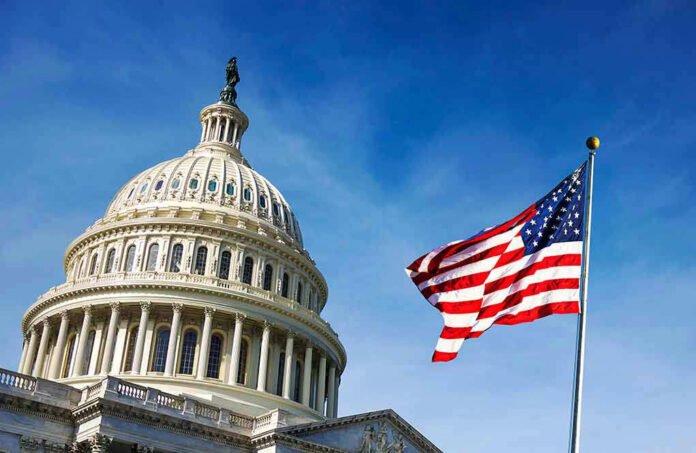
Senate Republicans are scrambling to salvage Trump’s $9.4 billion rescissions package before a looming deadline, while Americans are left to wonder how much more taxpayer money will be funneled into programs that make zero sense for the nation’s future.
At a Glance
- Trump’s $9.4B rescissions package faces a hard Senate deadline on July 18, threatening high-profile cuts to foreign aid and public broadcasting
- Moderate Republicans are pushing back, especially on cuts to global health programs and rural media outlets
- The White House argues these cuts target blatant government waste and leftist activism funded by taxpayers
- If the Senate amends the bill, it must return to the House, raising the risk that nothing gets done and spending continues unchecked
Trump’s Rescissions Package: A Test for Fiscal Sanity in the Senate
Donald Trump’s $9.4 billion rescissions package is now barreling toward a final showdown in the Senate, with the July 18 deadline bearing down like a freight train loaded with taxpayer cash. The House already gave its nod to the package, which zeroes in on sacred cows like foreign aid, the Corporation for Public Broadcasting (CPB), and a grab bag of leftist pet projects. The White House is making a simple case: these dollars should never have been spent in the first place, and they sure as heck shouldn’t be spent now. But in the hallowed halls of Congress, common sense is often in short supply. Instead, the Senate is bogged down with hand-wringing over whether we really need to keep sending billions abroad or funding public radio’s latest progressive sermon. If the Senate doesn’t act before July 18, the whole thing evaporates, and the administration is forced to shovel out the funds as originally planned—no matter how ridiculous the line items may be.
Meanwhile, Senate Majority Leader John Thune is sweating bullets as he tries to keep his caucus together. The math is brutal: a few moderate Republicans are threatening to torpedo the whole deal unless their favorite programs get carved out. Sen. Susan Collins, for example, is up in arms over the proposed axing of HIV/AIDS funding and rural broadcasters, while others are angling for carve-outs for their home states. The result? An endless cycle of “negotiations” that look suspiciously like business as usual: spend first, ask questions never. If the Senate caves and amends the bill, it gets punted back to the House, where more delay and dysfunction are all but guaranteed. The fate of the package is uncertain, but one thing is crystal clear: Washington’s addiction to spending your money on things that don’t benefit you isn’t going away anytime soon.
Who’s Fighting for What: Ideology vs. Fiscal Reality
The cast of characters in this fiscal drama couldn’t be more predictable. On one side, you’ve got Trump, OMB Director Russell Vought, and Senate sponsor Eric Schmitt—dead set on cutting what they call “blatant government waste and abuse.” Their targets include foreign aid grants for vasectomy messaging in Ethiopia and electric buses in Rwanda. Vought says taxpayers would be shocked to know what their dollars are supporting: “far-left activism, population control, and sex workers” neatly tucked into the federal budget. On the other side, Democrats—and some moderate Republicans—are clutching their pearls over the prospect of even the tiniest spending cut. Collins, for example, is adamant that she won’t support any package that touches PEPFAR or maternal health programs, and she’s got a handful of allies demanding carve-outs for local broadcasters and Native American reservations.
But let’s not kid ourselves: this isn’t really about public health or rural news. It’s about whether Congress can ever say no to spending, or if the only bipartisan agreement left in Washington is to keep the gravy train running. The broader context is even more jaw-dropping. After years of runaway spending—including a recent tax and spending bill that dumped even more cash into defense and border security—Congress now finds itself incapable of agreeing on even modest cuts. If this package can’t get through, what hope is there for cutting truly wasteful or ideological spending in the future?
What’s at Stake: Spending, Sovereignty, and the Future of Fiscal Restraint
The stakes could not be higher. If the rescissions package passes as-is, $9.4 billion instantly gets wiped from the books—money that would have gone to everything from overseas health programs to the woke echo chamber of public broadcasting. That means fewer dollars wasted abroad, and fewer taxpayer-funded platforms for the latest progressive fad. If it gets watered down by amendments, the cuts will shrink, but at least some cash might be saved. But if the Senate fails to act, the status quo prevails, and every cent gets spent as planned, no matter how little it does for American citizens.
The real question is whether Congress can muster the will to put taxpayers first, or if the endless cycle of government expansion and ideological spending will continue. The battle lines are clear: Trump and his allies want to prove that fiscal restraint isn’t just campaign rhetoric, while opponents insist that every sacred cow is too precious to touch. For frustrated Americans watching their dollars evaporate into a haze of global activism and government overreach, the outcome couldn’t matter more. If Washington can’t make these cuts, what hope is there for ever restoring sanity to the federal budget?
Sources:
Senate Republicans talk tweaks to Trump’s funding cut package
Senate Thune Collins Trump Rescissions Foreign Aid Radio Parliamentarian
Rescissions on the ropes in the Senate
What is a rescission package? Here’s how Republicans plan to make more cuts












